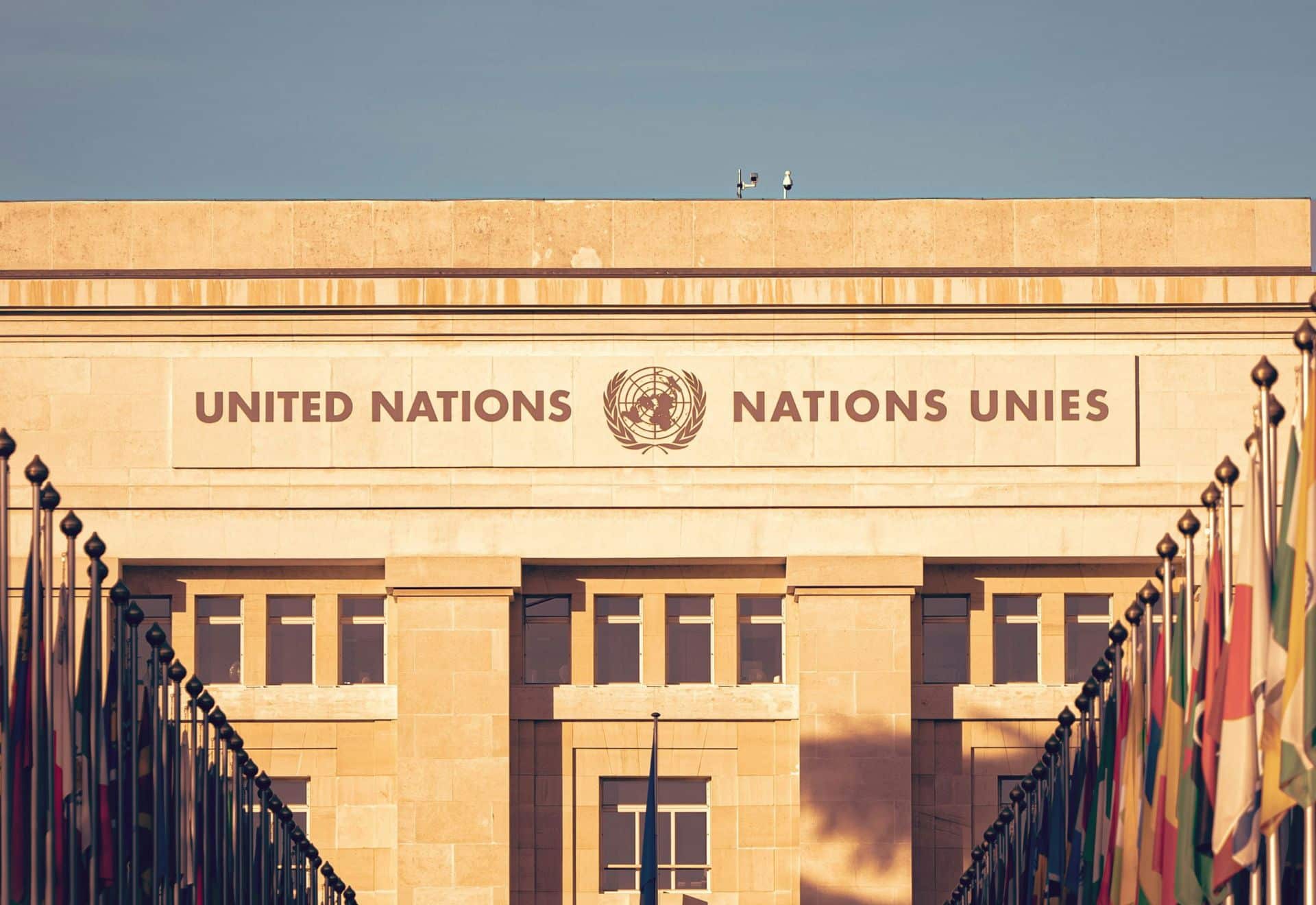Young Australians make UN climate complaint against federal government
MEDIA RELEASE – UNDER EMBARGO TO 12.05AM Wednesday 2 APRIL 2025.


Nine young people from across Australia have filed a human rights complaint with the United Nations’s Special Rapporteur on Climate Change against the Australian government for failing to protect their human rights to life, health and culture and ensure a safe future in the climate crisis.
With their legal team from Environmental Justice Australia, the diverse group of young people – calling themselves ‘Generation Justice’ – says the Australian government’s failure to act urgently on climate change is violating their human rights.
They say this breaches their human rights as children, people living with disabilities, First Nations people and people already impacted by climate change.
“While they drag their feet on climate action, we’re living through heat waves, bushfires, floods, and rising seas – our childhoods and futures have been stolen by their inaction,” says Maya Farmer, 19, from Sawtell in NSW, who lives in Melbourne/Naarm.
“We lost the chance to just be kids, so we’re filing this complaint with the UN to make sure we don’t lose our future too,” says Chris Black, 18, from Sydney/Eora.
“We prepared this complaint during the uninspiring and unambitious Labor government, but our message is even more urgent if a Coalition government gets in.”
“Country is always listening and keeps score and as I see climate change take hold and seeing the damage being caused to her, it is deeply painful to me,” says Zhanāe Dodd, a proud Aboriginal woman from Darumbal Country in Rockhampton.
Photos of the spokespeople
Go to generationjustice.org.au for bios and HERE for photos for media use. Please credit Environmental Justice Australia.
Witnessing climate disasters
The group includes young people with a diverse range of experiences and backgrounds, including First Nations people, people of colour and disabled and neurodivergent young people.
They have witnessed terrifying disasters such as bushfires, ‘supercell’ hailstorms and drought, and have seen their country and treasured natural places damaged by climate change. Their personal stories are a wake-up call to what it’s like growing up in the age of ‘global boiling.’
“Climate inaction is violating our rights but politicians continue to green-light fossil fuel projects, putting us and our communities at even greater risk,” says Ruby Fox, 19, from Western Australia, living in Hobart/nipaluna.
“Indigenous knowledge is tied to the land, the tides and the weather, but as the climate changes, so does our ability to pass down traditions. It feels like a second wave of colonisation – another force stripping Indigenous people of our way of life,” says Connor Wright, 27, a Larrakia man from Darwin, living in Melbourne/Naarm.
What’s the UN complaint?
The Generation Justice group says the Australian government’s lack of ambitious action on climate change is violating the human rights of young people right across Australia.
They want the UN to investigate the Australian government, provide recommendations and hold it to account for failing to protect their human rights – to life, health, culture – and ensure a safe future.
Environmental Justice Australia senior lawyer Hannah White says:
“Our clients have witnessed firsthand the sweltering heat, bleached coral reefs and bushfires fuelled by climate change. They say the Australian Government is failing to comply with international obligations to protect their human rights.”
Environmental Justice Australia senior lawyer Michaela Vaughan says:
“Our clients want the Special Rapporteur to put a global spotlight on Australia’s climate inaction and pressure it to protect the rights of young Australians.
What are the legal grounds?
Through their lawyers at Environment Justice Australia, the young people have told the Special Rapporteur in a formal complaint made on Tuesday 1 April that the government’s failure to meaningfully and ambitiously reduce the effects of climate change amounts to a violation of their human rights.
They will tell the Special Rapporteur Australia has weak climate targets, is expanding fossil fuels and gives billions of dollars in subsidies to the fossil fuel industry. Its current climate emissions target is consistent with a world that will warm between 2 and 3°C, not 1.5°C or below.
The UN complaint includes evidence of the harm that young people across the country are experiencing, and argues these failures violate their rights to life, health, culture and a healthy environment under international law.
Why the UN?
The Special Rapporteur on Climate Change is an independent expert appointed by the UN Human Rights Council to assess and promote the protection of human rights in the face of climate change.
As Australia has no national human rights Act and no duty of care enshrined in law, this is an important avenue for these young people to seek climate justice.
No country wants to be seen as neglecting human rights, so the group hopes this will create global pressure on Australia to cut its polluting emissions.
What’s next?
The Generation Justice group has submitted a detailed complaint about how the Australian government is violating their human rights.
The Special Rapporteur will consider the complaint and may ask the Australian government for a response. She may also visit Australia to see firsthand how climate change is affecting young people.
The group hopes the Special Rapporteur will advocate for the concerns of young Australians, raise them with the government as well as before the UN Human Rights Council or General Assembly.
Generation Justice hopes this complaint will push the government to take stronger action and create global pressure to cut emissions and protect young people’s futures.
For interviews with spokespeople call Environmental Justice Australia senior media advisor Miki Perkins on 03 8341 3110 or [email protected]
Generation Justice media spokespeople
DOWNLOAD photos for media use. Please credit Environmental Justice Australia.
Connor Wright, Darwin, NT + Melbourne, Vic
“My name is Connor, my cultural name is Djindjbad. I’m a Larrakia man from Darwin, going to uni in Melbourne. I grew up surrounded by family, spending time on country – fishing, swimming, and learning from my grandmother. But climate change is threatening everything I know.
“Seasonal shifts are disrupting Larrakia cultural practices. Our knowledge is tied to the land, the tides and the weather, but as the climate changes, so does our ability to pass down traditions. It feels like a second wave of colonisation – another force stripping Indigenous people of our way of life.
“I’ve worked in the oil and gas industry and seen the destruction first hand. I can’t stop thinking about climate change – I feel imprisoned by knowing the consequences of government inaction. That’s why I’m now studying climate change and policy – to fight for real action.
“Australia’s failure to cut emissions isn’t just a broken promise, it’s a betrayal of young people and Indigenous communities.
“Will our land still be there for future generations? That question keeps me up at night. The Australian government must stop fuelling the crisis and start protecting our future.”
Maya Farmer, Sawtell, NSW + Melbourne, Vic
“Hello. My name is Maya and I’m 19. I grew up in Sawtell, on the northern coast of NSW on Gumbaynggirr Country near Coffs Harbour and I’m now studying science in Melbourne.
“I’ve been involved in climate advocacy since I was 16 because of my disappointment in my government’s lack of ambitious climate action.
“My high school life was punctuated by a series of natural disasters in my region, such as the Black Summer bushfires and terrible supercell hailstorms that wrought extensive damage. I channeled my frustration and anxiety into action by joining youth and student climate campaigns. I have lobbied politicians in Canberra, organised fundraising concerts and I even went to COP29 in Baku, Azerbaijan, which was life changing.
“Climate change is terrifying. But losing hope is not an option. That is how I find the motivation to continue advocating for climate justice. It’s a cliché, but we genuinely do only have one planet.”
Ruby Fox, Margaret River, WA + Hobart, Tas
“My name is Ruby. I’m 21 and I live on Palawa land in Nipaluna/Hobart in Tasmania. I grew up rural Western Australia and saw the impacts of extreme weather and fire.
“I’m about to finish my studies in marine and Antarctic science. I was drawn to Tasmania for my studies, its wild nature and landscapes and its proximity to the Southern Ocean.
“Over the past six years I’ve watched areas of the Ningaloo reef be decimated by bleaching. A living reef vibrates with life but a dead one is a ghost town.
“The Australian Government needs to be held accountable for climate action. But the people who are meant to be leading our country always try and weasel their way out of things.
“We need to make rapid changes as quickly as possible. The Australian government needs to stop greenwashing and invest in grassroots community-based projects that make a real difference. This is an emergency, and we must act now. If we don’t it will be too late.”
Zhanāe Dodd, Rockhampton, QLD
“My name is Zhanāe and I am a proud Aboriginal woman from the Ghungalu, Wadja, Kaanju, Birri, Wiri, and Wungun peoples, belonging to the Gurubil skingroup. I live on Darumbal Country in Rockhampton, with strong connections to the Darumbal people through my mother’s side.
“I’ve witnessed how climate change is damaging my country and beyond, from my homelands to across the Pacific. It’s threatening the land we rely on and the cultural knowledge we carry. For First Nations peoples, the health of the land is inseparable from our wellbeing and our future.
“I am the founder of Guyala Yimba, a consultancy embedding First Nations knowledge into leadership, business, and cultural projects, and Burri Energy, a sustainable start-up advancing renewable solutions grounded in Indigenous ways of knowing and being.
“Through my work, I’m pushing for a future where Aboriginal wisdom leads the way in shaping climate solutions and caring for country.
“I want the Australian government to face up to its responsibility to care for the land. You can’t continue to take from the land without giving back.
“We’ve trusted our leaders to protect country and secure our future, but they’ve failed us. If we don’t act now, what will be left of our culture for our children? And their children after them?”
Chris Black, Sydney, NSW
“My name’s Chris. I’m 18 and live on Gadigal and Guringai land in Sydney.”
“I’m in year 12, studying remotely to manage my disabilities and pursue my climate activism. When I was younger, I wanted to be a scientist but now I want to be a lawyer and use it to make change in society.”
“This is my second human rights complaint to a UN Special Rapporteur. I first filed one in 2021 when I was 14, after living through the Black Summer bushfires and Cyclone Seroja gave me climate-triggered anxiety. Now, I’ve just seen things getting worse.”
“Climate change isn’t some future threat – it’s already impacting my life. I live with anxiety and disabilities that give me a higher risk of climate-related harm. I worry about the impact of climate change on my partner, an Aboriginal man, and his family.”
“I’ve been fighting for climate justice for a while – cleaning beaches, going to rallies, even advising my local council. But the Australian government keeps ignoring young people, so I’ve taken my case to the UN.”
“I believe the Australian government’s inaction is holding my generation back from the future we deserve. I want them to stop funding fossil fuel projects, listen to young people and protect First Nations culture and heritage.”
Media contact: Miki Perkins
[email protected] and 03 8341 3110
Environmental Justice Australia is a national public interest legal organisation. For more than 30 years, EJA has used the law for safe climate, thriving nature, environmental justice and a radically better world.
– ENDS –
